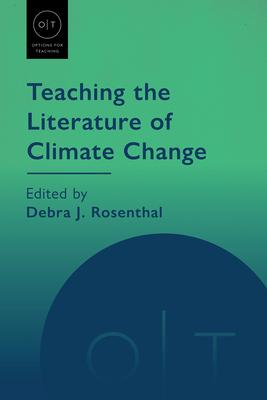Essays on teaching the global climate crisis through cli-fi
Over the past several decades, writers such as Margaret Atwood, Paolo Bacigalupi, Octavia E. Butler, and Kathy Jetn̄il-Kijiner have explored climate change through literature, reflecting current anxieties about humans' impact on the planet. Emphasizing the importance of interdisciplinarity, this volume embraces literature as a means to cultivate students' understanding of the ongoing climate crisis, ethics in times of disaster, and the intrinsic intersectionality of environmental issues.
Contributors discuss speculative climate futures, the Anthropocene, postcolonialism, climate anxiety, and the usefulness of storytelling in engaging with catastrophe. The essays offer approaches to teaching interdisciplinary and cross-listed courses, including strategies for team-teaching across disciplines and for building connections between humanities majors and STEM majors. The volume concludes with essays that explore ways to address grief and to contemplate a hopeful future in the face of apocalyptic predictions.
This volume contains discussions of Margaret Atwood's Oryx and Crake and Year of the Flood, Paulo Bacigalupi's "Pocketful of Dharma," Chantal Bilodeau's Sila, Octavia E. Butler's Parable of the Sower, Michel Faber's Under the Skin, Kathy Jetn̄il-Kijiner's "Dear Matafele Peinam" and "Two Degrees," Barbara Kingsolver's Flight Behavior, Elizabeth Kolbert's Field Notes from a Catastrophe, Cormac McCarthy's The Road, David Mitchell's Cloud Atlas and The Bone Clocks, Mayra Montero's In the Palm of Darkness, M. NourbeSe Philip's Zong!, Richard Powers's The Overstory, Nathaniel Rich's Odds against Tomorrow, Virginia Woolf's Orlando, and more.

Teaching the Literature of Climate Change
Essays on teaching the global climate crisis through cli-fi
Over the past several decades, writers such as Margaret Atwood, Paolo Bacigalupi, Octavia E. Butler, and Kathy Jetn̄il-Kijiner have explored climate change through literature, reflecting current anxieties about humans' impact on the planet. Emphasizing the importance of interdisciplinarity, this volume embraces literature as a means to cultivate students' understanding of the ongoing climate crisis, ethics in times of disaster, and the intrinsic intersectionality of environmental issues.
Contributors discuss speculative climate futures, the Anthropocene, postcolonialism, climate anxiety, and the usefulness of storytelling in engaging with catastrophe. The essays offer approaches to teaching interdisciplinary and cross-listed courses, including strategies for team-teaching across disciplines and for building connections between humanities majors and STEM majors. The volume concludes with essays that explore ways to address grief and to contemplate a hopeful future in the face of apocalyptic predictions.
This volume contains discussions of Margaret Atwood's Oryx and Crake and Year of the Flood, Paulo Bacigalupi's "Pocketful of Dharma," Chantal Bilodeau's Sila, Octavia E. Butler's Parable of the Sower, Michel Faber's Under the Skin, Kathy Jetn̄il-Kijiner's "Dear Matafele Peinam" and "Two Degrees," Barbara Kingsolver's Flight Behavior, Elizabeth Kolbert's Field Notes from a Catastrophe, Cormac McCarthy's The Road, David Mitchell's Cloud Atlas and The Bone Clocks, Mayra Montero's In the Palm of Darkness, M. NourbeSe Philip's Zong!, Richard Powers's The Overstory, Nathaniel Rich's Odds against Tomorrow, Virginia Woolf's Orlando, and more.